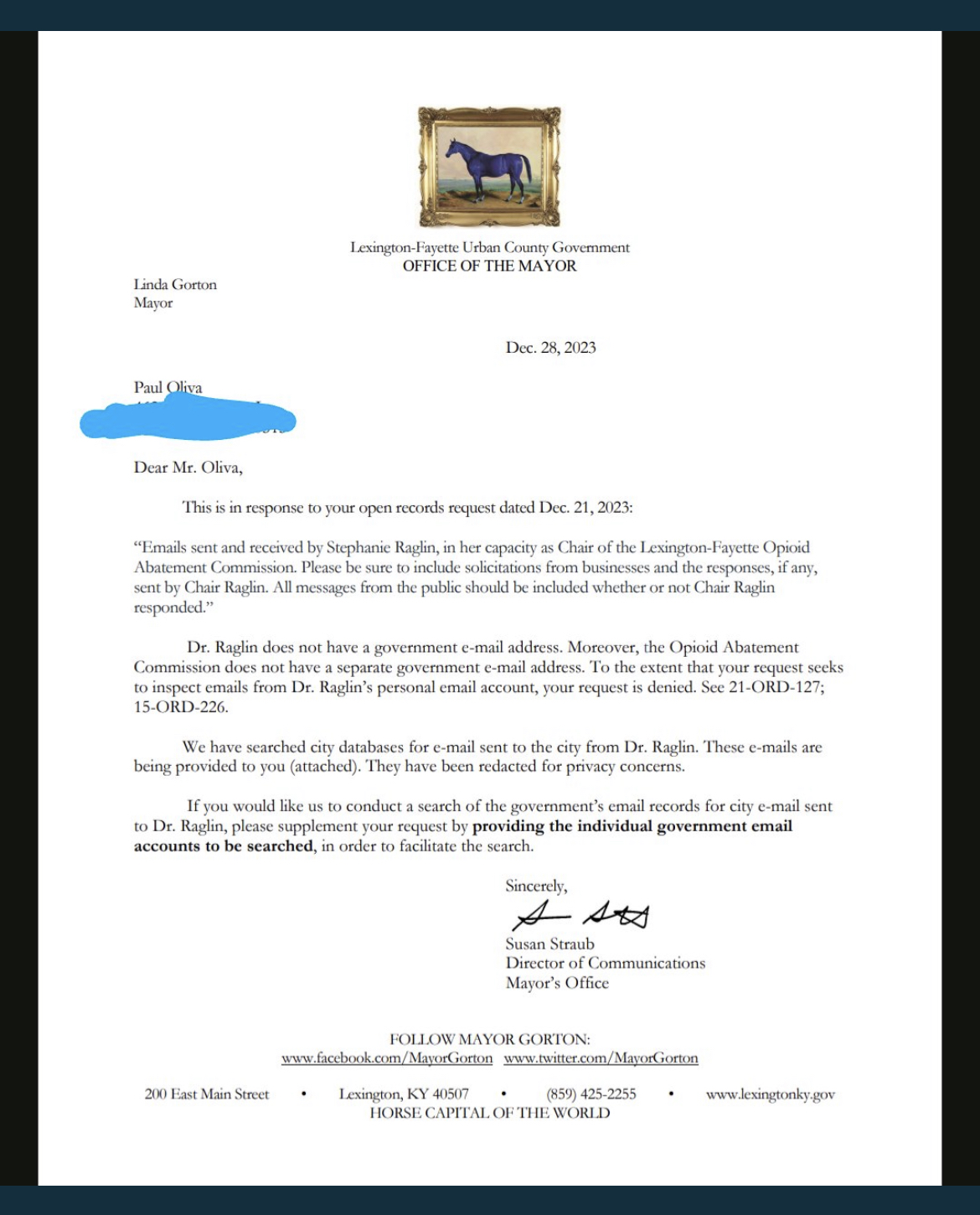
In the midst of the opening day legislative melee comes this important note about a public agency that should know better.
Lexington Fayette Urban County Government has officially taken the position that "[e]mails sent and received by Stephanie Raglin, in her capacity as Chair of the Lexington-Fayette Opioid Abatement Commission . . . to include solicitations from businesses and the responses, if any, sent by Chair Raglin [and] . . . messages from the public . . . whether or not Chair Raglin responded."
Relying on open records decisions that have been rejected by the Franklin Circuit Court (email relating to public agency business by agency officials on their private email accounts) and the Kentucky Court of Appeals (text messages relating to public agency business by agency officials on their private cellphones), LFUCG explained to the requester:
"Dr. Raglin does not have a government e-mail address. Moreover, the Opioid Abatement Commission does not have a separate government e-mail address. To the extent that your request seeks to inspect emails from Dr. Raglin's personal email account, your request is denied. See 21-ORD-127; 15-ORD-226."
https://x.com/hunterstrotson/status/1740842482605134035?s=46&t=W5grKM-b…
https://www.ag.ky.gov/Resources/orom/2015/15ORD226.doc
https://www.ag.ky.gov/Resources/orom/2021/21-ORD-127.pdf
LFUCG joins the ranks of public agencies that exploit the unsettled state of the open records law resulting from discredited open records decisions issued by immediate past Attorney General Daniel Cameron -- and a single open records decision issued by past Attorney General Jack Conway on his last day in office that was reversed by Attorney General Andy Beshear -- determining that electronic communications relating to public agency business, and exchanged by agency officials on their private devices or accounts, are not public records because they are not "possessed" by the public agency.
Both attorneys general ignored caselaw and years of administrative precedent recognizing that “it is the nature and purpose of the record, not the place where it is kept” that determines its status as a public record. Both ignored the plain text of the open records law and the definition of the term public record which includes documentation, regardless of physical form or characteristics, that is “prepared, owned, used, in the possession of, or retained by a public agency.”
https://cases.justia.com/kentucky/court-of-appeals/1999-08-12-1998-CA-0…1396122529
https://apps.legislature.ky.gov/law/statutes/statute.aspx?id=51390
https://www.ag.ky.gov/Resources/orom/2019/19-ORD-232.pdf
Both erroneously determined that because public official/employee communication about public business conducted on private devices or accounts was not “possessed” by the public agency the official or employee served, it was not a public record.
Two courts --as well as Attorney General Andy Beshear, who served between Conway and Cameron -- rejected the position taken by Conway and Cameron.
https://dcogc.org/wp-content/uploads/2022/03/Kentucky-opinion-on-text-m…
https://www.ag.ky.gov/Resources/orom/2019/19ORD011.doc
https://www.ag.ky.gov/Resources/orom/2019/19-ORD-206.doc (Note 5)
https://law.justia.com/cases/kentucky/court-of-appeals/2023/2022-ca-017…
But even in creating this massive hole in the open records law, Conway and Cameron discouraged the use of private devices and accounts to conduct public business and urged public agencies to assign public email addresses to all officials -- elected and appointed.
In resulting litigation -- Kentucky Open Government Coalition v Kentucky Department of Fish and Wildlife Resources Commission -- the Franklin Circuit Court expressed incredulity at the public agency's failure to assign public email addresses to its commissioners. The Court of Appeals' opinion in Kentucky Open Government Coalition v Kentucky Department of Fish and Wildlife Resources Commission turned on the expansive statutory definition of the terms “public record” and “public agency,” and on its rejection of the Commission’s privacy and undue burden arguments. But at a basic policy level, the opinion emphasized:
“To hold otherwise would certainly defeat the underlying purpose of the Open Records Act as public officials could easily evade disclosure of public records by simply utilizing their personal cell phones.”
In late November, 2023, the Department of Fish and Wildlife Resources Commission petitioned the Kentucky Supreme Court for "discretionary review" of the Court of Appeals' opinion. The parties await the Court's decision whether it will grant the Commission's petition.
In the meantime, LFUCG has elected to "evade disclosure of public records," erring on the side of nondisclosure and relying on discredited open records decisions issued by Conway and Cameron. It ignores the courts' resolution of the legal issue in favor of disclosure as well as their disapproval of practices aimed at "defeating the underlying purpose of the Open Records Act."
Finally, it ignores at least one simple expedient, namely, assigning public email addresses to the members of the Opioid Abatement Commission (and all other elected and appointed LFUCG officials). This would not entirely relieve LFUCG of its duty to produce emails secreted away on private accounts, but it's a start.
This shocking, and shameful, exploitation of a legal issue that lies at the heart of the open records law is another affront to transparency that should not be tolerated -- especially from a public agency with sufficient resources to "know better."


